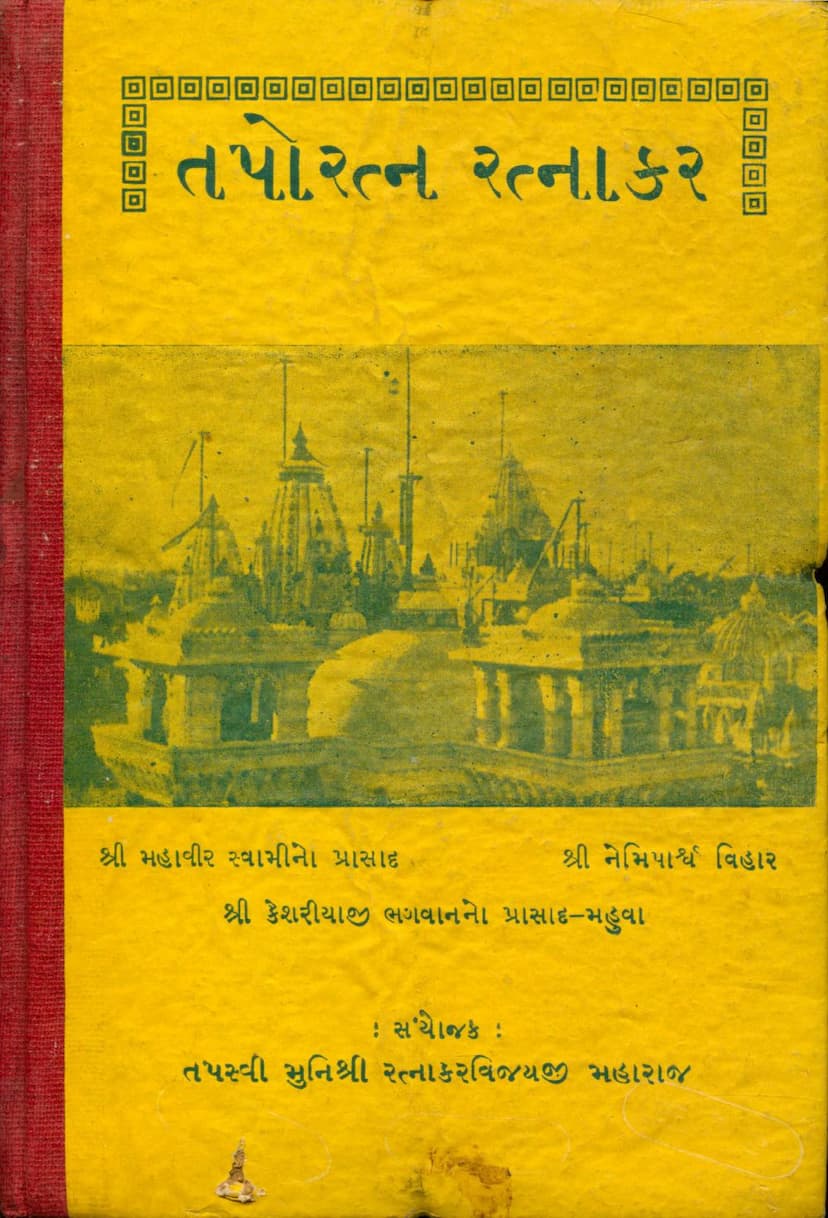Taporatna Ratnakar
Added to library: September 2, 2025

Summary
This document is the catalog description and a significant portion of the text from the book "Taporatna Ratnakar" by Muni Shri Ratnakarvijayji Maharaj. The publisher is Shri Mahavirprasad Jain Sangh. The catalog link provided is https://jainqq.org/explore/022961/1. The book was published in Vikram Samvat 2038, corresponding to 1982 CE.
The core theme of the text is the glory and importance of 'Tapas' (Austerities) in Jainism.
Here's a breakdown of the content based on the provided pages:
Key Themes and Content:
- Dedication: The book is dedicated to Lord Mahavir Swami, Shri Nemiparth Vihar, and Shri Kesariyaji Bhagwan. It is compiled by Tapasvi Muni Shri Ratnakarvijayji Maharaj.
- Publisher Information: Shri Mahavirprasad Jain Sangh, Mahuva is listed as the publisher. The publication year is mentioned as V.S. 2038 / 1982 CE.
- The Significance of Tapas (Austerities):
- Tapas is presented as the ultimate weapon to break the cycle of birth and death (samsara).
- It is described as a means to overcome negative karma, achieve spiritual growth, and attain liberation (moksha).
- The text emphasizes that even great souls like Tirthankaras, Chakravartis, and great Acharyas achieved spiritual heights through tapas.
- Unlike other virtues like charity (dan) and ethical conduct (shil), which may require certain resources or circumstances, tapas can be practiced by any individual according to their capacity and devotion.
- Definition of Tapas: The term 'tapas' is etymologically explained as that which purifies or burns (tapana) metals or karma.
- Power of Tapas:
- It's compared to fire that purifies gold, a swan separating milk from water, and a guru mantra for controlling senses.
- It's likened to fire that burns impurities, water that quenches the fire of desire, a snake charmer's mantra that controls senses, the sun that dispels darkness, and the root that nourishes prosperity.
- Analogy of Tapas as a Kalpa Vriksha (Wish-fulfilling Tree): The text beautifully describes tapas as a celestial tree with contentment as its strong roots, peace as its trunk, sense-control as its branches, fearlessness as its leaves, ethical conduct (shil) as its sprouts, faith as the water for nourishment, and the fruits as worldly prosperity, heavenly abodes, and ultimately, liberation (Shiva-pada).
- Health Benefits of Fasting/Tapas: The text touches upon the health aspects, mentioning that even modern societies recognize the value of fasting. It also cites instances where people with severe illnesses like cancer have recovered through the practice of fasting.
- Types of Tapas: The text mentions the two main categories of tapas: Bahya (External) and Antar (Internal), each with six sub-categories.
- External Tapas: Anshan (Fasting), Unodari (Eating less than usual), Vrittisankshep (Limitation of intake), Rasatyag (Renunciation of taste), Kayaklesh (Enduring hardship), Sanlinata (Controlling senses/actions).
- Internal Tapas: Prayashchitta (Atonement), Vinay (Humility/Respect), Veyavach (Service), Swadhyaya (Self-study/Scriptural study), Dhyaan (Meditation), Samliniata (Restraint).
- The Book's Purpose: The book "Taporatna Ratnakar" aims to explain the significance and methods of various tapas, filling a gap where books usually only detail the rituals without explaining the underlying importance. It includes brief explanations for each tapas, relevant stories, and aims to be concise to avoid reader fatigue.
- The Author's Achievement: The text highlights the extraordinary achievement of Muni Shri Ratnakarvijayji Maharaj in completing 108 continuous fasts, a rare and difficult feat. This accomplishment is presented as a testament to the power of tapas and is a central inspiration for the book.
- Specific Taps Mentioned: The book lists a multitude of specific types of tapas, including Akshay-nidhi, Brihas-panchami, Samvatsar (Varshitap), Chandanbala Tap, Ter Kathiya Tap, Navkar Tap, Panchrangi Tap, Moksha Tap, Meru Tap, Ayambil Vardhaman Tap, Rohini Tap, Gautam Padgho Tap, Kshirsamudra Tap, Navpadji ki Oli, and many more. A detailed index (Anukramanika) lists over 160 different types of tapas with their corresponding page numbers.
- Biographical Information of Revered Figures: The book includes biographical sketches of important spiritual leaders, particularly Muni Shri Ratnakarvijayji Maharaj, his gurus (Acharya Shri Vijay Nemisurishwarji Maharaj, Acharya Shri Vijay Darshan Surishwarji Maharaj), and his family members. It details their spiritual journeys, initiation, and contributions.
- Testimonials and Messages: The latter part of the document contains numerous congratulatory messages and blessings from various Jain Sangh organizations and individuals on the completion of Muni Shri Ratnakarvijayji Maharaj's 108 fasts. These messages praise his austerity, dedication, and the inspiration he provides to the Jain community. They often refer to his achievement as unprecedented and a great service to Jainism.
- Detailed Tap Procedures: A significant portion of the text provides detailed procedures for observing various tapas, including the specific fasts (ekasana, anulomi, etc.), the mantras to chant, the offerings to be made, and the associated rituals.
In essence, "Taporatna Ratnakar" is a comprehensive guide to the various forms of austerities (tapas) practiced in Jainism, highlighting their spiritual, karmic, and even perceived physical benefits, while also celebrating the exemplary asceticism of Muni Shri Ratnakarvijayji Maharaj. It serves as both an instructional manual and a source of inspiration for spiritual aspirants.